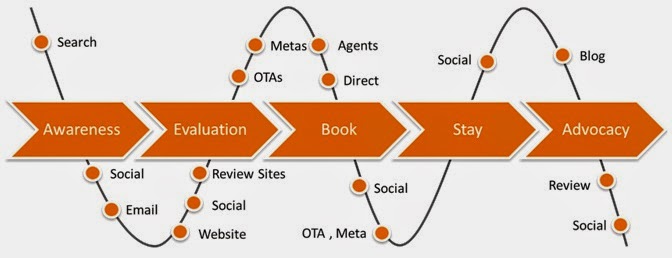There are total 2.92 billion people in the world having access to internet. Nearly half of them or 1.3 billion are from Asia Pacific. Last year, Asia Pacific became the largest regional ecommerce market and now contributes for more than a third of all business to consumer ecommerce sales in the world. The increase in online penetration has changed the travel behavior which traditionally preferred travel agencies, group bookings and in-person sales. Many are now choosing to travel in smaller groups, or even alone and preferring to self-manage travel by booking online.
PhoCusWright reports that in 2012 APAC region surpassed Europe to become the world’s largest regional travel market with US$326 billion in gross travel bookings. Despite slow economic growth and political turmoil in some countries in the region, an average 8% growth is expected this year taking the online travel market to $126billion, which is pretty mind-blowing. With 46% APAC travelers planning to book online, no wonder global giants like Expedia and Booking.com are eyeing for a share of the pie, where regional OTAs still rule.
Consider this – 69% of Chinese OTA market is controlled by three regional travel agencies Ctrip, eLong & Ly.com. In India MakeMyTrip, Cleartrip and Yatra have 60% of the market share. Japan, one of the largest online markets in the region, is dominated by Rakuten Travel.
In this article I list out five online travel agents who are playing vital role in shaping the online travel industry in Asia Pacific.
See Part I of the Article: The Big 5 – a look into top performing channels in the APAC region – Part I
Agoda, acquired by Priceline in 2007, is the most popular online travel agency (OTA) in five countries, namely Indonesia, Thailand, Malaysia, Philippines, Singapore, Hong Kong and South Korea in South East Asia and the only OTA to hold the top spot in multiple Asia Pacific (APAC) markets as per PhoCusWright. According to a recent report by Skift, Agoda receives total 30.7 million unique visitors per month of which 14.2% came from Indonesia and 7.8% from India. The channel is gaining preference as a leading site among Asia-Pacific bookers by adding inventory, enhancing mobile functionality and localizing content.
Baidu controlled Qunar.com is the fastest growing online travel agency in China. Qunar, which has its roots in meta-search has been offering bookings on its site. Given most of China’s hundreds of thousands of hotels are independent and previously offline, Qunar is working on a hybrid model – meta-search plus transaction one to bridge the needs between the hotels and the Chinese consumers. The channel now features over 200,000 properties in the domestic market for travel accommodation of which over 140,000 are small independent hotels, B&B and apartment-oriented listings.
Japan’s online leisure/unmanaged business travel market is by far Asia Pacific’s largest. Founded in 2002, Rakuten Travel is one of Japan’s largest online hotel reservation website with over 3.7 million room nights booked per month. The channel, a 100% subsidiary of Japanese e-commerce giant Rakuten receives 5.34 million unique visitors every month. The firm has access to more than 20,000 domestic and 15,000 international hotels and has a presence in South Korea and China.
Even though majority of travel booking in Asia still comes from offline, travelers in the region are rapidly moving from offline to mobile and online travel penetration is expected to reach upto 31% by end of this year. PhoCusWright predicts that aggregate mobile travel bookings in China, Japan and India will jump from US$4.6 billion in 2012 to $18.7 billion in 2015. Channels which have been early adapters to mobile travel will be ready for the challenge.
As hoteliers, are you ready to tap into the Asia Pacific market? Are you managing your channels well and keeping them automatically updated with rates and availability on a regular basis? eRevMax is developing 2-way XML connections with all global and regional distribution channels. Contact us today if you want to connect with these channels or want a platform to manage these channels smartly.
Image Courtesy: Hong Kong Street: Frédéric DUPONT – Freepik Images
Christy Toh is Sales Manager at eRevMax based out in Singapore. She can be reached at christinet@erevmax.com






